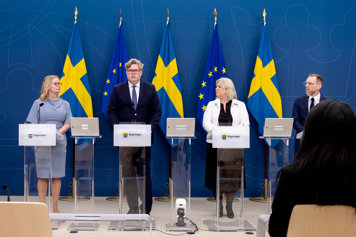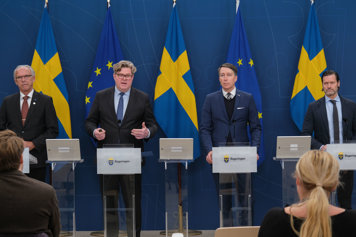Content about judicial system
Total 43 hits.
-
Nordic ministerial meeting on children and young people involved in crime
More and more children and young people are becoming involved in criminal networks, and stopping recruitment requires early interventions, knowledge-based methods and collaboration. Minister for Justice Gunnar Strömmer and Minister for Social Services Camilla Waltersson Grönvall therefore hosted Nordic countries, including the autonomous regions, for a discussion about children and young people who are, or risk being, involved in crime. The meeting was held within the framework of the ongoing Swedish Presidency of the Nordic Council of Ministers.
-
New national strategy to strengthen crime prevention efforts
To combat crime and increase security, investments in the judicial system and criminal law measures must be combined with effective and proactive crime prevention efforts. The Government has therefore presented a national strategy that focuses on social crime prevention measures. The aim includes preventing children and young people from becoming involved in criminal networks and other types of crime.
-
Sweden concludes agreement with France on fighting organised crime
Gang criminality and other forms of serious crime are major societal problems in both Sweden and France. Together, Sweden and France are now intensifying their efforts in the fight against organised crime. A new agreement will present new possibilities for closer cooperation in several areas.
Published · Press release from Gunnar Strömmer, Ministry of Justice
-
Resistance and action – Sweden’s national strategy against organised crime
The Swedish Government has adopted Sweden’s first comprehensive national strategy against organised crime. The strategy serves as a direction for the work against organised crime, with the purpose to reduce vulnerabilities exploited by criminals. The national strategy presents priorities and identifies central actors.
Published · Press release from Gunnar Strömmer, Ministry of Justice
-
Stricter requirements on acquisition of Swedish citizenship by notification and stronger protection for children and adults in vulnerable situations
In a referral to the Council on Legislation, the Government proposes amending the legislation on Swedish citizenship. The proposals entail stricter requirements on acquisition of Swedish citizenship by notification and better protection for children and adults in vulnerable situations.
Published · Press release from Maria Malmer Stenergard, Ministry of Justice
-
More effective law enforcement through Sweden’s participation in EPPO
The Government today decided to refer a proposal to the Council on Legislation regarding amendments necessary for Sweden to able to take part in the European Public Prosecutor’s Office (EPPO).
Published · Press release from Gunnar Strömmer, Ministry of Justice
-
Facts about migration, integration and crime in Sweden
Simplistic and occasionally inaccurate information about migration, integration and crime in Sweden is sometimes disseminated. Here, the Ministry for Foreign Affairs looks at some common claims.
Published · Updated · Article from Ministry for Foreign Affairs
-
Inquiry proposes new act on anonymous witness testimony
The Inquiry on anonymous witness testimony has presented its interim report to Minister for Justice Gunnar Strömmer. In its report, the Inquiry proposes introducing a system of anonymous witness testimony in criminal cases.
Published · Press release from Gunnar Strömmer, Ministry of Justice
-
New video surveillance offensive against criminal networks – new and better tools for the Swedish Police
Video surveillance is effective in preventing crime, is a valuable tool in criminal investigations and can be used to stop crimes while they are in progress. In light of the recent wave of violence, the Government has presented a new video surveillance offensive that will allow the Swedish Police Authority to make better use of facial recognition and automatic number plate recognition technologies and direct access to traffic cameras.
Published · Press release from Gunnar Strömmer, Ministry of Justice
-
Report on tighter property acquisition controls submitted to the Government
The Government has received the report ‘Who owns the property’ (Vem äger fastigheten). In the report, the Inquiry proposes measures aimed at preventing the Swedish property market from being exploited for crime and countering fraudulent conveyance of rental properties.
Published · Press release from Gunnar Strömmer, Ministry of Justice
-
Enhanced national collaboration and coordination to prevent violent extremism
Sweden is facing a deteriorating security situation, with an increased threat of attacks by terrorists and violent extremists. This situation requires additional measures, not least in efforts to prevent radicalisation and violent extremism. The Swedish National Council for Crime Prevention will therefore be tasked with enhancing collaboration between government agencies and other relevant actors to prevent radicalisation and the spread of violent extremism. This assignment will be carried out as part of the activities of the Council’s Swedish Centre for Preventing Violent Extremism.
Published · Press release from Gunnar Strömmer, Ministry of Justice
-
Swedish Security Service raises terror threat level
The Swedish Security Service has raised the terrorist threat level from level 3 (‘elevated’) to level 4 (‘high’) on a 5-level scale. In light of the deteriorating security situation, the Government is working intensively and constantly to take the necessary measures.
Published · Article from Gunnar Strömmer, Ministry of Justice
-
Review of Public Order Act to strengthen Sweden’s security
The Government has decided to appoint an Inquiry Chair to examine whether Sweden’s security could be considered when examining permit applications and setting conditions for public gatherings under the Public Order Act.
Published · Press release from Gunnar Strömmer, Ministry of Justice
-
New measures to strengthen Sweden’s security
Due to the serious security situation, there is greater need for control over who is attempting to enter Sweden and for what purposes. The Government has therefore decided to expand the mandate of the Police to intensify internal border control. This was announced at a press conference yesterday by Prime Minister Ulf Kristersson and Minister for Justice Gunnar Strömmer.
Published · Press release from Gunnar Strömmer, Ulf Kristersson, Ministry of Justice, Prime Minister's Office
-
Government agencies tasked with developing and intensifying counter-terrorism efforts to strengthen Sweden’s security
The reactions following the burning of copies of the Quran have led to a deteriorating security situation. The Government has therefore decided to task several government agencies with strengthening Sweden’s ability to prevent, avert and impede terrorism and violent extremism.
Published · Press release from Gunnar Strömmer, Ministry of Justice
-
Sweden’s work to ensure children’s and young people’s safe and secure upbringing
Every child and young person has the right to a safe, secure and bright future, to be properly cared for and to grow up in a home free from violence.
Published · Article from Ministry of Health and Social Affairs
-
More effective regulations under the Aliens Act in cases involving security considerations
The Government has decided to refer proposals to the Council on Legislation. Under these proposals, it would be possible to withdraw a residence permit if it can be assumed that the person will carry out state-sponsored corporate espionage or activities related to terrorism.
Published · Article from Maria Malmer Stenergard, Ministry of Justice
-
Participation in a terrorist organisation to be a punishable offence
Today, the Government proposed that participation in – and financing participation in – a terrorist organisation should be a punishable offence. This means that Sweden will have a new powerful tool to combat terrorism.
Published · Press release from Gunnar Strömmer, Ministry of Justice
-
New support for missions abroad in efforts to combat human trafficking
War and displacement bring with them an increased risk of people being exploited in prostitution and human trafficking. Women and children are at particularly high risk when families are separated as a result of war. New international support material has therefore been produced to support Swedish and foreign diplomatic missions in their efforts to combat human trafficking.
Published · Article from Ministry for Foreign Affairs, Ministry of Justice
-
Action programme to combat antisemitism
The action programmes intend to complement the National plan to combat racism, similar forms of hostility and hate crime, and include both measures aimed at bringing to light and combating each form of racism, and measures aimed at combating racism at large.
Published · Information material from Ministry of Employment






